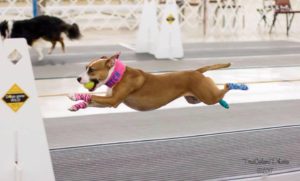By Dr. Beth Leermakers
Several years ago I transported Stitch, a sweet dog who wound up on the euthanasia list at a full north Texas shelter, from the shelter to her rescue group, Habitat 4 Paws. This energetic girl was too much for most potential adopters to handle. Fortunately, Stitch found her outlet and true calling — flyball — with her adopter, Kaitlyn Johnson. Last week, Stitch became the fastest American Staffordshire Terrier in flyball in the country, with a scorching course time of 4.117 seconds! Follow this amazing local athlete on Facebook (Stitch the Super Staffy) or Instagram (@stitch_the_super_staffy).
Does your high-energy dog need a lot of exercise and a “job”? Would you enjoy the challenge of canine competition? If so, flyball or agility may be for you.
Most Flyball races are team-based relay races in which two teams of four dogs each race side by side over a 51-foot long course with four jumps. Each dog must run down the course over the jumps; trigger a flyball box, releasing the ball; retrieve the ball; and return over the jumps. When one dog crosses the finish line, the next dog runs the course. The first team to have all four dogs finish the course without error wins the heat. Jump height is determined by the smallest dog on the team. All dogs, including mixed breeds, are eligible to compete and earn titles in North American Flyball Association (NAFA)-sanctioned tournaments.
NAFA, established in 1984, now has more than 400 active clubs and 6,500 competing dogs (flyball.org). NAFA tournaments are divided into divisions so that teams compete against other teams of equal abilities. NAFA sanctions over 300 tournaments a year across North America.
To find a flyball club near you, visit NAFA’s Flyball Locator: http://flyball.org/getstarted/texas.shtml. Kaitlyn is a founding member of a new agility club — Neon Glow Dogs. Message Kaitlyn (Stitch the Super Staffy) for more information.
Top Dog Obedience Training in Dallas and Garland, run by Pam Martin, offers indoor beginner flyball classes, private lessons and seminars. Stitch the Super Staffy trains at Top Dog, so you know it’s top notch. Check out Top Dog on Facebook or call 972-494-7387.
Dog Agility involves directing your dog through a pre-set obstacle course (14 – 20 obstacles) within a certain time limit. Obstacles can include tunnels, weave poles, tire jumps, seesaws and pause tables where the dog must stop for a set amount of time. Courses are designed specifically for each agility trial, so you’ll face new challenges at every competition. You use verbal cues and body language to tell your dog where to go next on the course.
All breeds, including mixed breeds, can participate in agility trials — from the smallest to the largest of dogs. To succeed at agility, your dog must:
• Be highly energetic
• Enjoy running and responding to instruction
• Get along with other dogs
To be eligible to compete in AKC Agility Trials, your dog must be:
• 15 months of age or older
• Registered with the American Kennel Club or listed with the AKC Indefinite Listing Privilege (ILP) program, which allows unregistered dogs of registerable breeds to compete in AKC Performance and Companion Events. Mixed breed dogs can be registered through the Canine Partners program to be able to compete
• Spayed or neutered
• In sound health and current on vaccinations.
Agility isn’t just about your dog. You, as his handler, are an important part of the team. You don’t have to be a super athlete, but you do need to communicate well with your dog.
Start by taking a class to introduce your dog to the obstacles and see if he has any interest in and aptitude for the sport. Not every energetic dog is cut out for agility. Years ago, I took my golden retriever to an agility practice session with a local trainer. Laredo, my 85-pound golden retriever, wasn’t a fan and kept running to hide in the trainer’s van. Zane, my husky/shepherd mix, seemed to enjoy a few of the obstacles, particularly the jumps. Because he trusted me, Zane followed my lead (and the treats). To win big in agility trials, you’ll probably need a border collie or Australian shepherd. Visit your local shelter or rescue group to adopt one of those supersmart, athletic, working dogs. Several local training facilities offer agility classes. To find an AKC Agility Club, for training and competition, visit the AKC website:
webapps.akc.org/club-search/#/agility. Check out the Dallas Agility Working Group: dawgagility.org/index.shtml. Whatever canine sport you choose, or if you prefer watching others compete, have fun with your dog!

